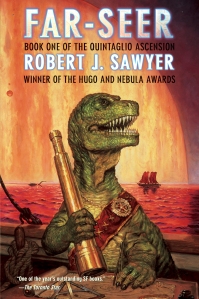The first time I picked up Far-Seer by Robert J. Sawyer it was in a library in my middle school. I had never heard of the book or the author before, but I was drawn to the cover, which unashamedly displayed the image of an evolved tyrannosaur wearing a sash and using astrological instruments. I’ve always been drawn to reptiles — and by extension dinosaurs and dragons — so I was immediately interested. Growing up, I always wanted a story focused on a reptilian character; even series like Redwall, which featured nonhuman characters, were all mammals.
It was a very specific desire to have from a story, I know, but it was something that always had me disappointed when I was a lot younger. I would find an old copy of The Hobbit with Smaug on the cover, only to learn that the story was not about the dragon. Far-Seer was the first book that promised to deliver the specific type of character I wanted to read about, and I eagerly borrowed it and read through it. What I was surprised to discover was just how well-written a piece of science fiction the novel really was, despite my shallow reasons for initially picking it up.
The novel is about Quintaglios, a race of evolved Tyrannosaurs on a different planet. Their society is in a stage of development that reflects the Renaissance era of humanity. The story follows Afsan, a young Quintaglio who is an apprentice to the Court Astrologer Tak-Saleed. Afsan is his most recent apprentice, many before him having been sent away for reasons unknown. After a run-in with an old friend of his master’s, Afsan acquires a new invention called a far-seer (a telescope) which he wants to use on his pilgrimage to get a better look at The Face of God — a mysterious object in the sky that Quintaglios worship.
Much of the novel is a coming-of-age story, as we see Afsan go through the hunting trials and pilgrimage that all Quintaglios must go through, the reader learning about their social cues, subtle nuances, and the institutions of their society in the process. It is during this pilgrimage that Afsan discovers the truth about their place in the universe and the state of the world, which puts him at odds with the Quintaglio faith. Ultimately the story is one of scientific discovery and innovation struggling against fundamentalist dogma and mysticism, and it does so in a compelling way despite the almost completely alien setting.
I find Quintaglio society fascinating. While some have criticized them for coming across as too human, I view it more as a necessity to avoid completely alienating the reading audience. There are a lot of great little details in how they are depicted that really helps to capture the imagination. As a few examples, there are little to no references to weapons outside of their own predatory appendages. They are naturally equipped with claws and razor sharp teeth, so there is no need to have invented weapons. Also, their chairs are angled slabs of stone that they lie upon, since the way their body is oriented does not allow them to sit the way we do. The novel is full of little details like this that really flesh out the world.
While a story about dinosaur people may sound juvenile, and admittedly I don’t think the cover helps, it is often rather grave in how it tells its story. Aside from the violent nature through which they hunt, which is described in uniquely graphic detail, the plot escalates to violence between Quintaglios that is rather severe as well, including instances of mutilation and sadism. The conflict between revealing the truth and destroying the opiate of the masses is at the forefront of the narrative as well, a far more mature and contentious issue than I had expected the novel to present when I first picked it up.
To sum it up, I love this novel because it tells a story about beings I find very appealing and tells an excellent science fiction story while doing so. I discovered later on, when I remembered having read the book, that Far-Seer is actually a part of a trilogy: The Quintaglio Ascension trilogy. The second and third books are entitled Fossil Hunter and Foreigner, for those who are interested. It’s been a long time since I read through the whole trilogy and though I loved the latter two installments, there will always be a special place in my heart for Far-Seer. Even if this were the only installment written, I think the story stands well on its own, as I believed to be the case for years. I don’t think it’s the best book ever written, but it will forever be one of my most favourite.


